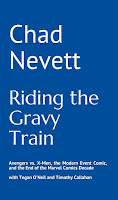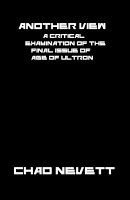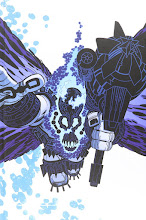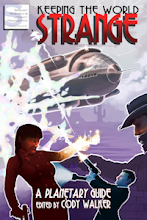A few weeks back, I skipped picking up the second issue of this series because I didn't know anything about these characters--or cared. But, the pickings were slim at the bookstore and it features Noh-Varr from Marvel Boy, so I wanted to see how they've butchered him.
The intro/recap page is shit. There are fourteen characters that we are told about, except we're not told anything of any actual interest. Oh, we know their names now, good, but who cares? For the Runaways, we're told who each one is a kid of; for example, Chase Stein is the "Son of Mad Scientists." Great. Now, what the fuck does that mean? Does he have some cool mad scientist technology? He is a mad scientist himself, but in a good way? The only character that makes sense is Old Lace, who is a genitically engineered dinosaur. I understand what that means.
For the Young Avengers, we get their codenames and then their real names, which, again, tells me nothing. I can make guesses, but I don't know any of their details really. This group's example: Hulkling. I'm guessing he's like a teenage version of the Hulk (the retarded name tipped me off--seriously, he's called Hulkling?), but how exactly? He's green and looks maybe strong? Is he a rage freak too? A mindless destroyer? What?
The actual story recap: it's the whole Superhuman Registration Act thing again and apparently both groups chose no. So, the Young Avengers find out the Runaways need help and are all like "They're teens too! We have to save them!" Except, there's a misunderstanding and both groups are all like "I hate you!" But before they can kill each other, Noh-Varr shows up all mind-controlled by the warden of a superhuman prison called the Cube (where Marvel Boy left him--but I will discuss that shortly--oh I will discuss that shortly) and he's going to fucking kick their asses.
So, we jump into the story and what happens? Noh-Varr kicks their asses.
The opening sequence is rather cool and well done. Writer, Daniel Wells, brings back a concept Morrison introduced where Noh-Varr is able to go into a mental state where he's basically on automatic and everything around him is white, so he can focus on the activity he's doing. In Marvel Boy, it was running. Here, it's kicking ass. In the first two pages, we see Nov-Varr in various action poses totally alone in the white. On the next two pages, we get the externals filled in in exact duplications of what we already saw.
The rest of the issue is just fighting as Noh-Varr overcomes every attempt to injure or stop him and these kids realise they're fucked. Interspaced are random shots of the evil warden who is overweight and balding and just looks evil--which helps the reader know he's evil, of course.
What we don't get is any more of a clue who these kids are. But, that kind of works for the issue--at least, it did in my case because I was hopin Noh-Varr would kill the whole lot of them. And I'm pretty sure the only reason he doesn't most of the time is the standard "We can't kill off these characters!" argument.
As for Noh-Varr himself, I'm going to have to call bullshit on the whole thing. Not his actual fighting abilities as that seems right, but the whole brainwashed by the evil warden shit. It makes for a nice story where you get an unstoppable killing machine already created, but, um, how did this warden manage to accomplish brainwashing Noh-Varr exactly? It was mad very, very clear in the Marvel Boy mini series that Noh-Varr is much, much, MUCH more advanced than humans. He's millenia above us, mentally and physically. As Morrison ended the series, he would be running that place within six months.
But, I have to admit that thinking that is limited only to myself and anyone else who read that series. A fan of Runaways or Young Avengers or the average reader may not know that stuff and won't have their reading experience affected negatively as a result.
Mine was, though. And I guess I'm showing my fanboy colours, but, seriously, it's bullshit. This evil warden is basically a bad Midas rip-off (complete with the love of dissecting aliens and superpeople) and Noh-Varr defeated Midas, but gets broken by this greasy fat guy with a bad haircut? Seriously: bullshit.
At the end of the issue, the evil warden has taken some prisoners, picked up Noh-Varr (who has Vision's arm stuck in his chest and doesn't care--seriously, he has a robot's arm phased into him and doesn't notice, but was broken by lame villain guy?), and the remaining teen heroes are all like "We're gonna get our buddies back and kick ass against that organization who has the weird alien guy who we were lucky to survive a fight with! We're not at all morons! Joss Whedon is writing some of us soon and Allen Heinberg said he's doing more Young Avengers, so you know we're gonna survive somehow! We rule!" Actually, the exact speech, said by the son of the mad scientists, is (begin cringing now, by the way) "After Gert I never wanted to see another one of my friends die. I would have given anything to say out of this silly 'Civil War.' We tried to run away from it, because we thought it was just between the adults. But they never asked us what side we were on . . . they just attacked. And took our friends. Now we're in it. Like it or not. The time to be runaways is over . . . it's time to do some avenging." Yikes. Horribly melodramatic speech in the best Stan Lee tradition--complete with the final shot of all of the characters standing shoulder-to-shoulder as if they weren't all just standing around like regular people would two seconds previous.
The art in the issue is well done--although I'm not a fan of that digital inking/straight to colours style that's used here. For all the chaos, it never gets confusing as to what's going on and, basically, you could understand what happens without reading a single word. Despite that final shot of the characters--no doubt in the script--Stefono Caselli does a great job.
Fans of the two teen hero series will possibly like this--I can't say since I know nothing about them beyond some basics. People who don't know anything about either group will probably wonder who the fuck they are. Fans of Marvel Boy will throw the book across the room in frustration.
Surprisingly, I think I'm going to get the next issue just to see where things are left with Noh-Varr--because I'm a glutton for punishment.
Wolverine #48 annotations
1 hour ago






